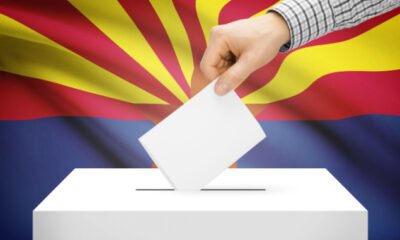2024 election
Open Primaries Ballot Measure Faces Uncertain Future

The Arizona Supreme Court has directed counties to include a measure on the upcoming ballot, allowing voters to decide on the potential elimination of partisan primaries. The ruling, issued on Thursday, marks a significant step in the electoral process.
However, the legitimacy of these votes remains uncertain, hinging on continued legal scrutiny. The court’s 10-page order indicates that Proposition 140 seeks to amend various sections of the Arizona Constitution regarding election procedures. Chief Justice Ann Scott Timmer emphasized that the provisions within the measure are interconnected and address a single subject, despite altering multiple constitutional clauses.
Still, questions linger about unresolved challenges to Proposition 140. The court instructed Secretary of State Adrian Fontes to place the Make Elections Fair Act on the general election ballot, unless otherwise directed. Yet, the justices acknowledged uncertainty surrounding the validity of the signatures collected to support the measure.
On Wednesday, the justices criticized Maricopa County Superior Court Judge Frank Moskowitz for excluding evidence regarding the signature count. They required him to re-evaluate the evidence on potential duplicate signatures, calling for clear and convincing proof.
Moskowitz has since expressed skepticism about reviewing the nearly 43,000 contested signatures before the impending ballot printing deadline. He postponed the hearing until September 3. Andrew Pappas, an attorney representing the proponents of Make Elections Fair, suggested that the timeline could nullify challenges to the petition.
He stated, “The ballot printing deadline moots pending disputes,” indicating that further legal arguments may be rendered irrelevant. However, Chief Justice Timmer clarified that courts are not mandated to resolve all disputes before such deadlines.
Should ballots be printed with Proposition 140 included, and subsequent rulings determine it should not have been, this raises procedural dilemmas for election officials. Options could include a court order preventing the counting of votes relating to the measure.
This decision follows a thorough examination by the Secretary of State’s Office, which validated approximately 409,474 signatures from a total of 575,000 collected. Nonetheless, the minimum required for a constitutional amendment stands at 383,923, which creates a precarious threshold for the proposal’s success.
The implications of this measure are profound, promising a transformative shift in Arizona’s political landscape. Currently, candidates must secure party nominations in primaries restricted to party members, leaving independents with limited participation. Advocates argue that an open primary system could compel candidates to appeal to a broader electorate.
Under the proposed system, all candidates would compete in a unified primary, enabling every registered voter to cast a ballot. The Legislature would retain authority to determine how many candidates advance to general elections, potentially allowing for multiple names on the ballot.
Another contentious element includes the option of ranked-choice voting, which has drawn scrutiny from legislative proponents. A prior ruling deemed that the summary presented by the Legislative Council favored ranked-choice voting, potentially biasing voter perception.
As legal battles continue, the urgency for resolution remains, particularly with upcoming deadlines for ballot materials set for early September. Voters in Arizona face an array of crucial decisions that may reshape the electoral framework.
![Top left: Judge Stephen F. McCarville. Top right: A restraining order on a judge's bench. Background: Maricopa Municipal Court. [Bryan Mordt/City of Maricopa/Pix4free]](https://arizonanews.org/wp-content/uploads/2025/06/City-Faces-Surge-in-Restraining-Orders-Outpacing-Population-Growth-400x240.jpeg)
![Top left: Judge Stephen F. McCarville. Top right: A restraining order on a judge's bench. Background: Maricopa Municipal Court. [Bryan Mordt/City of Maricopa/Pix4free]](https://arizonanews.org/wp-content/uploads/2025/06/City-Faces-Surge-in-Restraining-Orders-Outpacing-Population-Growth-80x80.jpeg)




![Top left: A handgun photographed at the scene of a May 15 shooting in Rancho Mirage. Bottom left: Thomas Ray Crew faces life in prison. Background: Attorneys discuss Crew's case in Pinal County Superior Court May 30, 2025. [David Iversen, Pinal County Sheriff's Office/graphic]](https://arizonanews.org/wp-content/uploads/2025/06/In-Law-Shooter-Thomas-Crew-Pleads-Not-Guilty-Faces-750K-Bond-400x240.jpeg)
![Top left: A handgun photographed at the scene of a May 15 shooting in Rancho Mirage. Bottom left: Thomas Ray Crew faces life in prison. Background: Attorneys discuss Crew's case in Pinal County Superior Court May 30, 2025. [David Iversen, Pinal County Sheriff's Office/graphic]](https://arizonanews.org/wp-content/uploads/2025/06/In-Law-Shooter-Thomas-Crew-Pleads-Not-Guilty-Faces-750K-Bond-80x80.jpeg)










